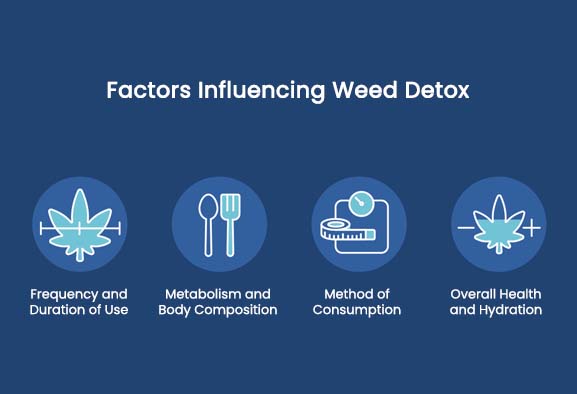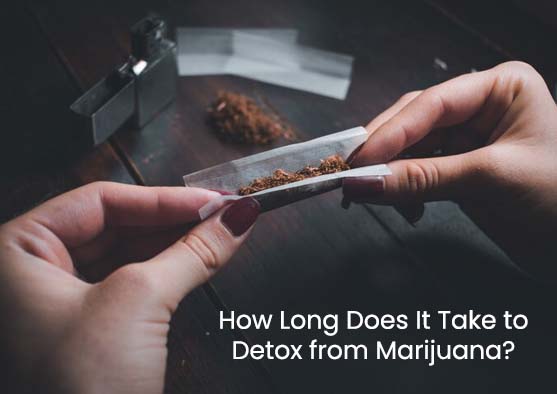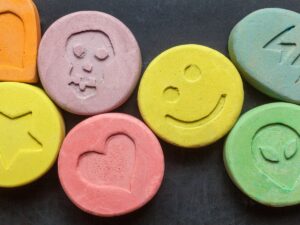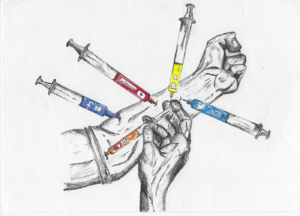Marijuana detoxification, a process that garners much curiosity, entails the elimination of THC, the psychoactive compound in marijuana, from the body. While there isn’t a one-size-fits-all answer to the question “How long does it take to detox from marijuana?” several factors influence the duration of this process. Let’s find out in this blog.
How Long Does It Take to Detox from Marijuana?
While individual experiences may vary, the following is a general timeline outlining the phases of marijuana detoxification:
Initial Phase (0-24 Hours):
During the initial phase, individuals may begin to experience withdrawal symptoms within the first 24 hours of cessation. These symptoms can include irritability, anxiety, insomnia, and increased appetite.
Acute Phase (1-3 Days): The acute phase typically lasts between one to three days, during which withdrawal symptoms intensify. Users may experience mood swings, cravings, and physical discomfort as the body adjusts to the absence of THC.
Subacute Phase (4-14 Days):
The subacute phase, lasting approximately four to fourteen days, sees a gradual reduction in withdrawal symptoms. However, some individuals may continue to experience mild symptoms such as irritability and difficulty sleeping.
Residual Phase (15+ Days):
The residual phase encompasses a period beyond two weeks post-cessation. While most withdrawal symptoms subside during this phase, some individuals may experience lingering effects such as occasional cravings and changes in mood.
Factors Influencing Weed Detox

Frequency and Duration of Use:
The frequency and duration of marijuana use significantly impact detoxification timelines. Individuals who consume marijuana regularly and for prolonged periods may experience a longer detox process compared to infrequent users.
Metabolism and Body Composition:
Metabolism and body composition play pivotal roles in detoxification. Individuals with faster metabolisms and lower body fat percentages often process and eliminate THC more rapidly, resulting in shorter detox periods.
Method of Consumption:
The method of marijuana consumption also affects detoxification. Inhalation methods such as smoking or vaping typically lead to faster absorption of THC into the bloodstream, potentially prolonging the detox process compared to oral consumption methods like edibles.
Overall Health and Hydration:
General health and hydration levels influence detoxification. Well-hydrated individuals with optimal overall health may detoxify more efficiently than those dehydrated or with underlying health issues.
What Are the Effects of Marijuana?
Marijuana, also known as cannabis, can have various effects on the body and mind. While some people use it for medicinal purposes, and its legal status varies by location, it can have several harmful effects, particularly with long-term or heavy use.
Here are seven potential harmful effects of marijuana:
-
Mental Health Issues
: Marijuana use has been linked to an increased risk of psychiatric disorders, including anxiety, depression, and schizophrenia, especially in individuals with a predisposition to these conditions. Heavy use can exacerbate symptoms of existing mental health issues.
-
Cognitive Impairment
: Regular marijuana use, especially when started at a young age, can lead to cognitive impairment. Users may experience difficulties with attention, memory, and learning. These effects can be long-lasting or permanent, with some studies suggesting impacts on the developing brain.
-
Respiratory Problems
: Smoking marijuana can harm the respiratory system, similar to how tobacco smoking does. It can lead to chronic bronchitis, lung infections, and an increased risk of respiratory diseases. The combustion of marijuana releases carcinogens and other harmful chemicals.
-
Addiction
: Despite some beliefs that marijuana is not addictive, a significant number of users can develop a dependency on the drug. Marijuana use disorder is an actual condition where users experience withdrawal symptoms such as irritability, sleeping difficulties, cravings, and restlessness when trying to quit.
-
Impaired Coordination and Reaction Time
: THC, the psychoactive component of marijuana, affects areas of the brain that control body movements and reaction time. This can impair motor coordination and driving ability, increasing the risk of accidents.
-
Altered Brain Development
: For adolescents and young adults, marijuana use can alter brain development, affecting areas responsible for emotion, decision-making, and impulse control. This can result in permanent changes in cognitive function.
-
Cardiovascular Risks
: Marijuana use can increase heart rate and blood pressure, which may pose risks for individuals with heart conditions or a predisposition to cardiovascular disease. There is a higher risk of heart attack immediately after marijuana use due to these effects.
Treatment Options Available for Marijuana Addiction at All American Detox
At All American Detox, we understand the challenges individuals face when dealing with marijuana addiction, and we’re here to help. Our facility offers a range of treatment options tailored to address the unique needs of each individual seeking recovery.
Medical Detoxification:
Our medical detox program provides a safe and supportive environment for individuals to withdraw from marijuana under the supervision of medical professionals. We offer personalized treatment plans to manage withdrawal symptoms and ensure a comfortable detoxification process.
Individual Counseling:
Our licensed therapists offer one-on-one counseling sessions to help individuals explore the underlying causes of their addiction, develop coping strategies, and set achievable goals for recovery.
Group Therapy:
Group therapy sessions provide a supportive community where individuals can connect with others facing similar challenges. Through sharing experiences and offering mutual support, participants gain insight, encouragement, and accountability on their journey to recovery.
Behavioral Therapy:
Our behavioral therapy programs, such as Cognitive Behavioral Therapy (CBT) and Dialectical Behavior Therapy (DBT), equip individuals with practical skills to identify and change unhealthy thought patterns and behaviors associated with marijuana addiction.
Holistic Therapies:
In addition to traditional therapy approaches, we offer holistic therapies such as yoga, meditation, art therapy, and mindfulness to promote overall well-being and support the mind-body connection in recovery.
Aftercare Planning:
At All American Detox, we understand that recovery is a lifelong journey. Our team works closely with each individual to develop a comprehensive aftercare plan, including referrals to ongoing therapy, support groups, and community resources to maintain sobriety and prevent relapse.
(Check out our latest blog on Hashish Addiction Treatment)
Conclusion
While withdrawal symptoms may be challenging to navigate, understanding the detoxification process can empower individuals on their journey toward sobriety. If you’re considering weed detox, it’s essential to consult with a healthcare center like All American Detox to develop a personalized plan tailored to your needs and circumstances.
Suppose you or a loved one is struggling with marijuana addiction. In that case, we encourage you to contact the All American Detox Center in Los Angeles and California to learn more about our treatment options and how we can support you on the path to healing.






1 Comment
I’m not that much of a online reader to be honest but your blogs really
nice, keep it up! I’ll go ahead and bookmark your site to come back later
on. Cheers
Comments are closed for this article!